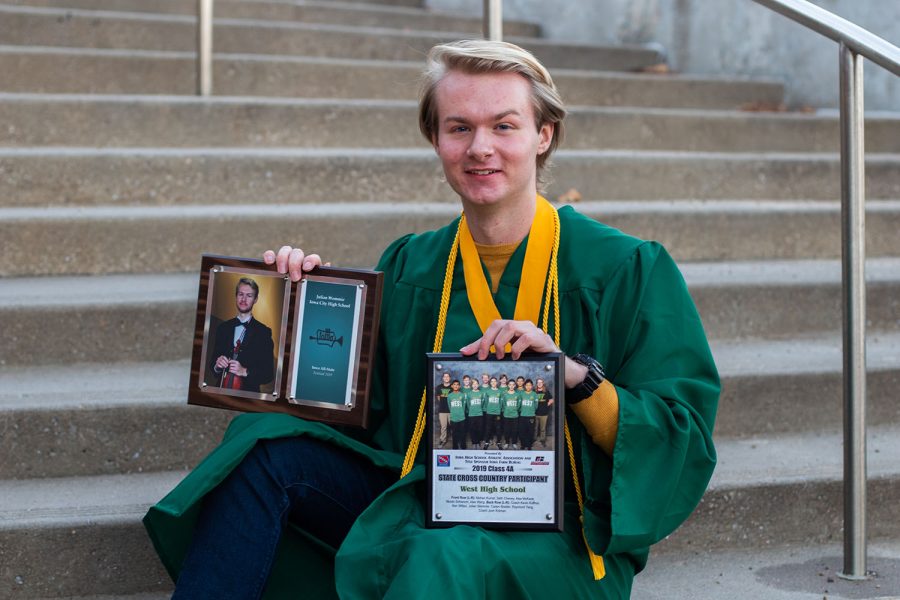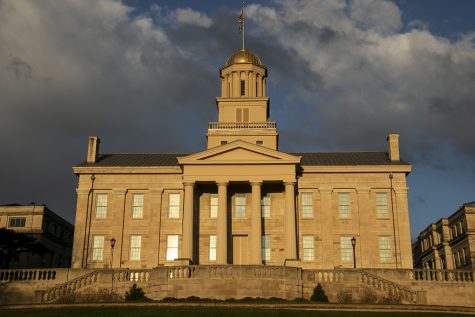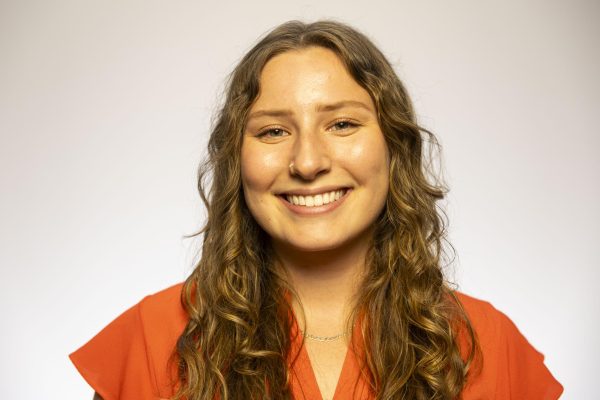Iowa high school counselors say that every university has its own ‘admissions game’
For first-year applicants at the University of Iowa, The Regents Admission Index system (RAI) does not consider extracurricular activities, which high school counselors stress.
University of Iowa freshman Julian Wemmie poses for a portrait in front of his high school, Iowa City West. Wemmie was involved in numerous extracurricular activities throughout his time at West.
November 17, 2020
Julian Wemmie is a University of Iowa freshman studying chemistry on a pre-med track. To prepare for college, Wemmie’s goal was to be a “well-rounded” student.
Balancing his time with playing the violin in his school’s orchestra, participating in the jazz and pep bands, running varsity cross country and track, studying piano, playing ultimate frisbee, volunteering in his community, and participating in student senate, Wemmie still managed to graduate at the top of the 2020 graduating class at Iowa City West High School.
“Frankly, I enjoyed all of [my activities], you know, and other times it was really stressful,” he said. “I think a lot of it was my own choice and curiosity and passion, but I think there was this push in the background saying, ‘Hey, you know, we volunteer because that’s what people think you should do.’”
Wemmie scored a perfect 36 on the ACT. When he was accepted at Iowa, it was those things – his grade point average, his class rank, and his ACT score – that made all the difference. In fact, they made the only difference. His many high school activities – the kind of activities encouraged by high-school counselors – may have been enriching but did not factor into his college acceptance or scholarship awards at the UI.
In the 2019-20 common data set report from the UI Office of the Executive Vice President and Provost, the “basis of selection” for first-year applicants ranks decision categories from “very important” to “not considered” when viewing a student’s application. The factors marked as very important include the rigor of secondary-school record, class rank, academic GPA, and standardized test scores. Volunteer work and extracurricular activities, however, are not considered of UI applicants.
Infographic by Chloe Peterson/The Daily Iowan
For admittance into all three of Iowa’s public universities, the institutions consider the Regents Admission Index (RAI) formula, which is listed on the state Board of Regents website. It consists of the students’ ACT composite score, cumulative GPA, and RAI-approved high school courses completed in the specific core subject areas. To be automatically admitted to the UI, a student must qualify to have a RAI score of 245 or above. When reached for comment, regents spokesperson Josh Lehman provided an overview of the process and pointed to the regents’ admissions website for further information.
In addition to the UI, Wemmie applied to Boston University, University of Chicago, and Harvard. For those universities, extracurriculars may make a difference. Wemmie said he chose the UI because of the uncertainty surrounding the COVID-19 pandemic and how long it will last, and he wanted to stay close to his family in Iowa City.
The Princeton Review, a college-admissions service, pushes extracurriculars.
“Commitment to a sport, hobby, religious organization, or job over four years of high school is key,” the Princeton Review’s College Admissions Guide said.
Dave Kennedy, a counselor at Linn-Mar High School, said Linn-Mar is ranked as the second high school in Iowa, after Valley High School in West Des Moines, to send the most students to the UI. Normally, about 60-75 out of 574 students go to the UI from every graduating class, he said, and about 5 percent of students at Linn-Mar apply to private and Ivy League institutions.
“Many students who are applying our way are quite a bit above that 245 [to qualify for the RAI],” he said. “We can also kind of summarize it from what our research has shown is when a student typically has a 3.25 grade point average, then they’re going to be in really good shape to get that 245.”
Although extracurriculars are not necessary to reach the RAI qualifications, guidance counselors still say they are worth students’ time.
Tom Carey, a counselor at City High School, said the RAI is a system to create efficiency in the application decision process at the UI. He said selective schools do not have this in mind.
Because the RAI is so simple, Cedar Falls High School College and Career Counselor Chris Wood said if students are checking a box or putting something on their résumé, they are doing it for the wrong reason.
RELATED: Board of Regents to waive ACT requirement for 2021 entering class
The RAI doesn’t work for every student’s situation. Wood said he had a student who took an unusual course load with a program at Cedar Falls High School called the Center for Advanced Professional Studies (CAPS), an elective course that allows students to learn outside of the classroom.
When applying to the UI, university admissions counselors interviewed the student instead because the student’s RAI didn’t qualify the student for acceptance into the UI.
Wood said that he hopes to see more programs like CAPS in the future.
At a 2019 regents meeting, regents’ Associate Chief Academic Officer Jason Pontius said 6 percent of incoming freshmen had an RAI of less than 245 in the fall of 2018. If a student is below the RAI score of 245, he said, university admissions will conduct a holistic review of the student.
“The universities understand that life happens and there may be extenuating circumstances affecting a student’s metrics for their RAI score,” Pontius said “It gives them a chance to kind of go through and look at the whole student to determine whether that student is going to be capable of doing college-level work,” he said.
Kirk Kluver, assistant provost, director of UI admissions said that the goal is to make sure that students admitted to the University of Iowa are prepared to succeed academically.
“A student who is denied admission because they don’t meet the RAI may ask to appeal that decision and provide some additional information to have their admission reconsidered,” Kluver said. “We do work very closely with students and what we can tell them, that there is a pretty clear pathway to transfer here–we certainly want to work with them and get them to Iowa eventually,” he said.
RELATED: University of Iowa admissions recruits the class of 2025 virtually
Carey said he has seen his students lose the benefits of some extracurricular activities because of COVID-19. He said this time has intensified how important that connection is for students.
“Overall, every college sets up its own specific admissions game,” Carey said. “I think it’s important for students to consider the same thing for scholarships at the institutions, which are set up by the colleges. So, just doing your best everyday and finding meaningful activities — those are the things that really are going to help us stand the best chance of success after high school.”
Wood said his students are far behind and overwhelmed in the college-admissions process, with COVID-19 disruptions.
“They didn’t get that opportunity junior year to take visits, because obviously COVID. I think that they’re kind of teeter tottering between that stress and ‘I just want to give up,’” he said. “I think that you see a lot of applications to our regents because they’re simple, but I think what we’ll see is a lot more students taking the two-year route [community college], just to be safe, not knowing what next year looks like.”
If he could redo high school, Wemmie said he would focus on one specific extracurricular and rearrange his priorities.
“I ended up being pretty decent at a lot of things, but I was never outstanding in any one category,” he said. “… By specializing a little bit more in high school, I would have an easier time figuring out what I want to do at university.”





















